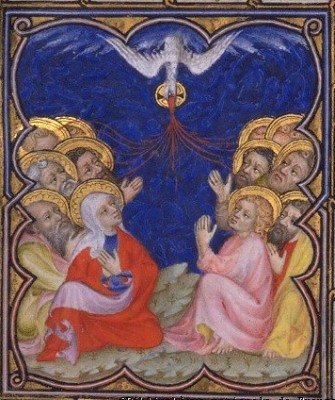The
Catechumenate*
(Preparation for Adult Baptism)
The Catechumenate is a
period of preparation in which a Catechumen, defined here as a person capable
of making mature faith decisions of faith and commitment for themself and desiring to be a Christian,
undergoes training and formation in the Christian Faith within the Christian
community. There is no specified length of time this period may last since
readiness for baptism is determined by the catechumen in conjunction with Sponsors, Catechist (Teacher) and the clergy. This period typically, but not always, lasts between
three months to a year.
In the Episcopal Tradition, Catechumens are often baptized on the Great Vigil of Easter, usually held on the Saturday night
before the Sunday morning Easter Service. It has been St. Peter's recent tradition to baptize Catechumens on Pentecost Sunday (50 days after Easter Sunday), a common practice in old days of the British Isles from whence our Christian tradition comes.
There are three stages of
the Catechumenate.
STAGE 1:
Inquiry. During this time
catechumens are instructed to examine their own motivations that they may
freely choose Christ of their own accord. Preconceived notions of Christianity
are also called into question. Inquirer’s classes are encouraged and group and individual meetings with the Catechist and clergy are encouraged.
STAGE 2:
Catechumenate. Each person
wishing to be baptized is presented by at least two sponsors to the congregation
in a liturgical rite held at a Sunday Eucharist. This rite usually includes
signing of the cross upon the forehead by the priest, a commitment from the parish community to pray for and encourage the catechumen in love, grace, and mercy,
and the catechumen’s commitment to the following:
1)
Regular
attendance at Sunday Eucharists with their sponsors. (Heb. 10:24-25)
2)
Attendance at
regularly scheduled meetings (at least twice a month) with sponsors and
teachers. The topics of discussion will include the most recent Scripture
readings and other Biblical readings as well as the catechumen’s experience of
the Christian Faith as they are living it. (Acts 2:42)
3)
Daily recitation
of the Daily Office, meaning praying Morning and Evening Prayer. (1 Thess. 5:17)
4)
Practice of the
Christian Way of Life with the understanding that earnest striving and
faithfulness are our goals, not perfection. (Matt. 22:36-40; 1 John 1:5-10)
It is during this second stage
that the Catechumen, accompanied by sponsors, the catechist, and others, will experience and digest a significant portion of the Christian faith. Typically, this reflection occurs by reflecting upon the worship and Scripture lessons of Lent, Holy Week, and Easter. The format for this period of learning is to experience first and then to reflect and discuss.
STAGE 3: Candidacy for Baptism. This stage includes a series of liturgical acts that
are designed to complete the preparation of the Catechumen for Holy Baptism. They are as important for
the candidate as they are for the community and take place at the
Sunday morning liturgy. Typically, the following are observed:
1)
Ash Wednesday
2)
Enrollment of Catechumens
for Baptism on the first Sunday of Lent.
3)
The Presentation
of the Creed on the Third Sunday of Lent (or Easter 2)
4)
The Presentation
of the Lord’s Prayer on the Fifth Sunday of Lent (or Easter 4)
5)
Vigil before
Baptism (observed the evening immediately before the day or night of baptism)
6)
Baptism at The
Easter Vigil or at the Feast of Pentecost
7)
The Sunday
Following Baptism (Easter Sunday, Easter 2, or Trinity Sunday)
THE BAPTISMAL LIFE: Holy Baptism, like marriage, is
not a certificate program. Completion of the process does not mean one is
finished, just as getting married does not mean the marriage is completed and
over. Rather, in both Baptism and marriage, the sacrament signifies the beginning of a new relationship.
Therefore, it is expected that the newly Baptized will
continue in that new relationship to God and to their neighbor, “devoting themselves
to the apostles' teaching and to the fellowship, to the breaking of bread and
to prayer” (Acts 2:42). And also that they will remember in prayer and action
the poor and the neglected, the orphans and the widows, the oppressed and
forgotten, just as Christ has remembered us.
And so, “let us consider how to
provoke one another to love and good deeds, not neglecting to meet
together, as is the habit of some, but encouraging one another, and all the
more as you see the Day approaching.” (Heb. 10:24-25)
* This information is based on the
Catechumenate pattern set forth in The
Book of Occasional Services, 2003 by Church Pension Fund, copyright 2004
and used by permission.



















